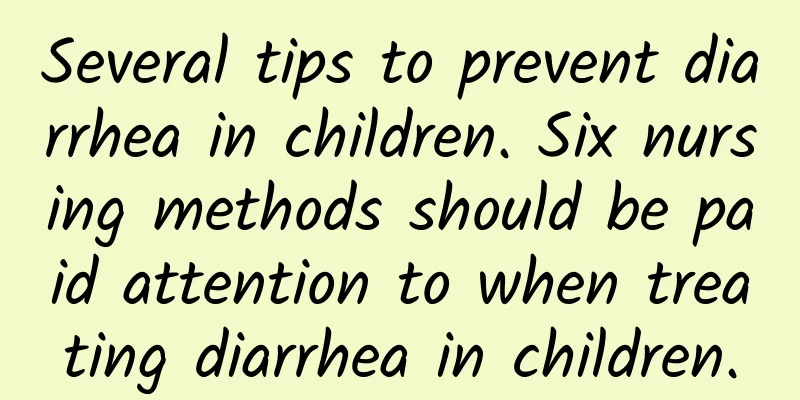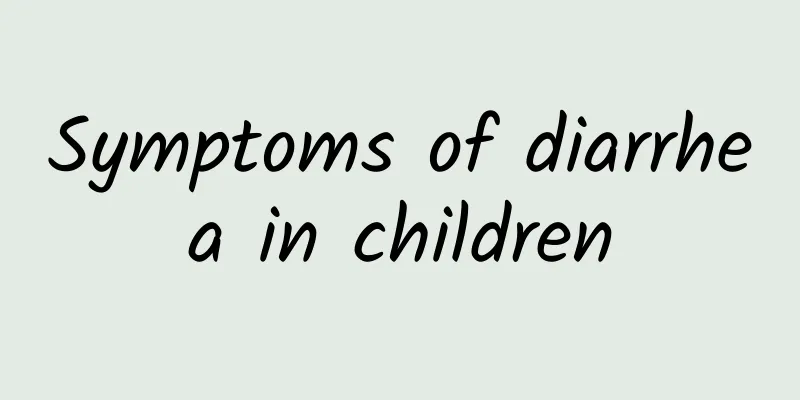Several tips to prevent diarrhea in children. Six nursing methods should be paid attention to when treating diarrhea in children.

|
Among common pediatric diseases, pediatric diarrhea is the second most common and frequently occurring disease after respiratory tract infection. Infection is the most common cause of diarrhea in children. In addition, children's gastrointestinal function is not perfect, and allergies to breast milk or certain foods can also cause diarrhea. How can we prevent and care for pediatric diarrhea? What are the methods to prevent and treat infant diarrhea? Pay attention to 6 nursing methods for children with diarrhea 1. Breastfeeding can prevent diarrhea Breastfeeding should be especially adopted in the first few months after birth. Breast milk is the most suitable for infants' nutritional needs and digestive ability. Breast milk contains a variety of digestive enzymes and antibodies needed by children. Various nutrients are very suitable for children's digestion and absorption. It can neutralize Escherichia coli enterotoxins and prevent infection with Escherichia coli. It is much better than cow's milk and breast milk substitutes. Breastfeeding should be encouraged except for those suffering from tuberculosis, heart and kidney and other chronic diseases. Attention should be paid to the correct feeding method, regular breastfeeding, and avoiding weaning in summer and when the child is sick. Breastfeeding can prevent diarrhea in children. 2. Use a bowl and spoon instead of a bottle Bottles, especially rubber nipples, are easily contaminated and difficult to clean and disinfect. They are easily contaminated and can cause diarrhea in children. Use a bowl or spoon instead, which has less chance of contamination than a bottle. 3. Timely fluid replenishment to prevent dehydration Most cases of diarrhea in children start very quickly. Frequent diarrhea can cause rapid loss of water and nutrients in the body, resulting in acute dehydration. At home, parents can add 20 grams of sugar (two level spoons) and 1.75 grams of salt (half a beer bottle cap) to 500 ml of boiled water (or rice soup) to make oral rehydration solution. Since children with diarrhea need more fluid than usual, they should be encouraged to drink more at the beginning. Children under 2 years old can supplement with 50 to 100 ml of oral solution after each diarrhea, and the daily intake should not be less than 500 ml; those over 2 years old should drink as much as possible, with a daily intake of not less than 1000 ml or even more to prevent dehydration. If the child has symptoms of dehydration, he should go to the hospital immediately and continue to replenish oral fluids on the way. 4. Add complementary food on time Children grow and develop rapidly. Whether they are breastfed or bottle-fed, complementary foods should be added on time to meet their nutritional needs. When adding complementary foods, the variety should not be too many, and the changes should not be too frequent. Only after the baby gradually adapts to the new food can other foods be gradually added. Specifically, when adding complementary foods, pay attention to the baby's digestive ability. Only one type can be added at a time, from a small amount to a large amount, and gradually increase. Generally, vitamin C and D are added half a month after birth, vegetable soup, milk cake or rice paste are added at 2 to 3 months, and egg yolks, minced meat and chopped vegetables are added at 4 to 6 months. 5. Pay attention to the quality of your diet When mixed feeding and artificial feeding are adopted due to insufficient breast milk or lack of breast milk, attention should be paid to diet adjustment. It is not advisable to feed rice porridge or other foods too much or too early to avoid carbohydrate indigestion and affect the growth and development of children. If infants from birth to 3 months do not have enough breast milk, they can be supplemented with milk or soy milk. Whether using cow's milk or milk substitute, it needs to be properly diluted to facilitate digestion and absorption. When the appetite is poor, it is not advisable to force feeding. 6. Enhance physical fitness Usually, we should strengthen outdoor activities, improve the ability to adapt to the natural environment, pay attention to physical exercise of children, strengthen their physical fitness, improve the body's resistance, and avoid infection with various diseases. 7. Avoid adverse stimulation Children should avoid excessive fatigue, fright or excessive mental stress in their daily lives, as these may cause diarrhea in children. How to care for children with diarrhea 1. Hygiene and home isolation are essential Rotavirus is highly contagious and occurs all year round. Autumn and winter are the peak seasons for infection, so it is called "autumn diarrhea" for short. This disease is prevalent in all parts of my country. If a child has autumn diarrhea, you must pay attention to hygiene. Parents should wash their hands carefully before feeding their children; children's utensils, toys, and tableware should be cleaned and disinfected frequently. After each use, the bottle should be boiled and disinfected at high temperature for 20 minutes; sick children should be isolated at home, feces should be properly handled, and toilets and diapers should be thoroughly disinfected; children's utensils should be separated from adults, and sick children should have special disinfection containers and sterilizers. 2. Identify the culprits of autumn diarrhea The pathogen of this disease is mainly rotavirus. Rotavirus, like other viruses, is not afraid of antibiotics. Antibiotics eliminate normal intestinal bacteria, which can easily cause secondary flora imbalance, secondary infection, stimulate bacteria to release toxins, and affect the absorption function of the intestine. In addition, the use of antibiotics is also ineffective for non-infectious pediatric diarrhea caused by improper diet, climate change, etc. Domestic survey results show that the use rate of antibiotics in the treatment of autumn diarrhea is as high as 50-80%, which shows that the abuse of antibiotics is relatively common. In fact, the Chinese diarrhea treatment program points out that 70% of acute watery diarrhea is mostly caused by rotavirus or toxin-producing bacteria, and antibiotics can be used without them. As long as fluid therapy is done well, microecological regulators and mucosal protectants are selected, most children can be cured; about 30% of children with purulent and bloody stools are mostly caused by invasive bacteria such as Shigella dysenteriae, invasive Escherichia coli, Salmonella, etc., and sensitive antibiotics are still advocated. Usually a local effective antibiotic is used. If the condition does not improve after 48 hours of medication, consider changing to another antibiotic. The misuse of antibiotics will lead to an increasing number of drug-resistant bacterial strains, and may also cause secondary intestinal flora imbalance, fungal enteritis, etc., causing diarrhea to prolong or worsen. 3. Replenish water and prevent dehydration Children can be given oral rehydration therapy with highly effective and inexpensive oral rehydration salts (ORS, available in hospitals and pharmacies). Each time a child has diarrhea, he or she should take about 50-100 ml of ORS to prevent and treat dehydration. If standard ORS is not available, soup with salt solution can be used. The specific formula is: 500 ml of rice soup (a bottle of 1 jin wine) + 10 grams of sugar (2 flat spoons of 5 ml) + 1.75 grams of fine salt (half of a flat beer bottle cap) + 500 ml of water and boil for 2-3 minutes. 20-40 ml per kilogram of body weight, take within 4 hours, and take it orally at any time in the future, as much as the child can drink. If the child's diarrhea worsens, accompanied by high fever, frequent vomiting and diarrhea, and combined with dehydration, he or she should go to the hospital for treatment in time. 4. Home care and careful observation Pay attention to the changes in the child's consciousness, mental state, facial expression, limb temperature, pulse, etc., and pay attention to whether dehydration improves or worsens; observe the frequency, volume and properties of bowel movements, and carefully keep various records; keep some fresh stools and send them to nearby hospitals for testing, which will help diagnose the cause and provide a reliable basis for disease treatment; do a good job of bedside isolation, and wash hands carefully before and after nursing the sick child to prevent cross infection; the sick child's diaper should be changed in time after each bowel movement, and the anus and surrounding areas should be washed with warm water to prevent buttocks redness and urinary tract infection. If buttocks redness has already formed, tannic acid ointment or chlortetracycline cod liver oil can be applied. At the same time, pay attention to whether there is urination. 5. Eat properly and recover quickly Children with diarrhea generally do not need to fast. Even if they need to fast, it should not exceed 6 to 8 hours. Because fasting may cause hunger diarrhea in children, dehydration and electrolyte imbalance, and malnutrition (long-term fasting or long-term diet control). Excessive supplementation of high-protein, high-nutrition food may aggravate diarrhea and is not conducive to the repair of the child's stomach and intestines. When a child has diarrhea, the feeding time can be appropriately extended and the feeding dose can be reduced. When the child does not eat, do not force it, and do not limit it if the child likes to eat very much. Professor Cui Qiliang pointed out that the key to the treatment of autumn diarrhea in infants and young children is to continue feeding. Children who are artificially fed should eat lactose-free milk powder or 1/2 diluted milk; children who have added complementary foods can eat porridge or noodles. Take oral rehydration salts, do a good job of fluid therapy, and use drugs reasonably. Generally, the course of the disease can be completely cured in 5-8 days. 6. Seek medical advice for urgent illness with complete information When a child has severe diarrhea or is accompanied by other symptoms, parents must take their children to see a doctor in time. When you go to the diarrhea clinic, don't forget to bring stool, as long as it is within 3 days. Only by checking the stool can you distinguish the child's condition from other intestinal diseases, make an accurate diagnosis, and prescribe the right medicine. 7. Daily feeding: Eat less but not more Mothers love their children very much. They like to see their children eat more and wish that their children could eat all the delicacies in the world. Every day, they try their best to arrange various recipes and various nutritional combinations for them. There is definitely nothing wrong with this method, but the key is to master the quantity. In fact, it is better to eat less than more. The amount of vegetables per day is slightly increased, but less meat is eaten. If you feel that he is not digesting well one day, don't eat. Eat more fish and less meat for meat. If necessary, you can reduce one meal of complementary food, but don't reduce milk and fruit. This is easy to digest and ensures nutrition. In this way, the resistance of the child's digestive system is guaranteed, and the immune system is slowly established. If you eat too much food, it will inevitably cause the digestive system and metabolic system to overload, and the kidneys and liver will be overloaded. Soon, food accumulation will become stagnant heat, which will remain in the body, hinder normal circulation, reduce resistance, and cause disease. It's still the old saying: "To keep children safe, three-point hunger and cold" can be said to be the truth passed down by generations of raising children. |
<<: Is it common for mumps patients to have orchitis? Try these 9 delicacies to treat orchitis
Recommend
Early symptoms of diarrhea in children
Children often become dehydrated when they have s...
How do you lose your sense of taste?
Losing your sense of taste can be one of life'...
Which department should I go to for diagnosis of ADHD?
Diagnosis of ADHD in children should be made in t...
How to treat neonatal jaundice
How to treat neonatal jaundice? When neonatal jau...
How to treat baby eczema
When a baby develops eczema, parents can first ap...
What are the differential diagnoses for polio?
Many patients with polio first think of the diffe...
Choice of staple food for children with pneumonia
What should children with pneumonia eat? During t...
Diagnosis of congenital megacolon in children What are the symptoms of congenital megacolon in children
Measuring the reflex pressure changes of the rect...
What are the dangers of ADHD in children?
Attention deficit hyperactivity disorder (ADHD) i...
What Chinese medicine should I take for patent ductus arteriosus
What Chinese medicine can be taken for patent duc...
Can Children's Cold Relief Granules treat runny nose?
Xiaoer Ganmao Ling Granules can relieve runny nos...
Do you know the common misunderstandings in the diagnosis of Kawasaki disease?
What are the common misunderstandings in the diag...
The main symptoms of pneumonia in children are
The main symptoms of pneumonia in children includ...
Causes of pneumonia in children
Many children suffer from pneumonia because their...
How to detect polio
Poliomyelitis, also known as poliomyelitis, is an...









